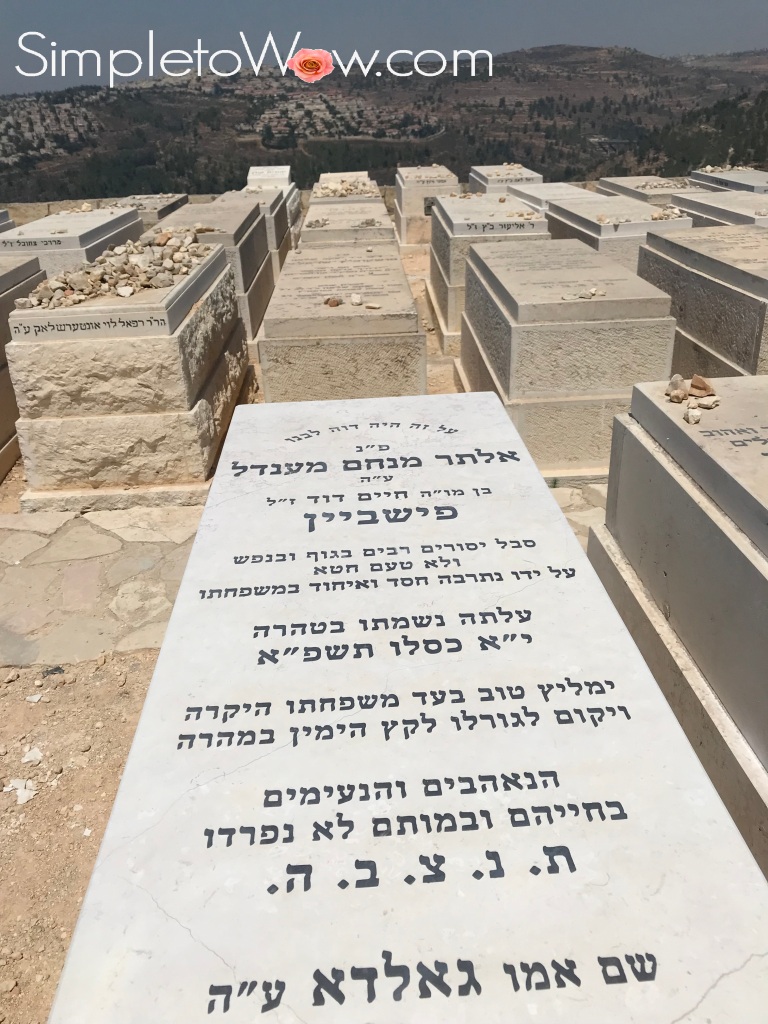
Today is the first yahrzeit for my Uncle, my mother’s brother, Alter Menachem Mendel ben (R’) Chaim Dovid. It is a time for reflection upon a life, both tragic and beautiful. It is an opportunity for us to look back upon the life and soul of someone who without a single word offered us a glimpse into the darkest and holiest part of ourselves.
Menachem a’H was the youngest of my mother’s siblings, born into an era and into a world that could not understand or appreciate the beauty and holiness of his neshoma (soul). While the greatest of our leaders would stand up with the utmost of respect when Menachem and others like him entered the room, his neighbors stared and shunned him.
Menachem was a strong but silent child. My mother would describe how she would take Menachem by the hand as she ran errands for her family and how she would be haunted by the unfriendly glares of her neighbors. Painfully, my mother recalls taking Menachem to the fruit store as he ran into the street amid the stares and angry screams of the other shoppers. Although the Rebbeim whom the family consulted saw greatness in Menachem’s soul, my mother cannot recall any neighborhood compassion and empathy for Menachem and her family’s struggle to raise him. The stigma of birthing and raising a child with pervasive developmental issues was too much for my mother and her family to bear.
Menachem loved gefilte fish and Shabbos, yet could not modulate himself to his neighborhood’s cadence.
My grandparents were unequipped to continue raising Menachem in their neighborhood. It was too difficult for their family to continue daily living within their community with a child that could not be accepted. His neighbors saw tragic deformity and impairment, never glimpsing long enough to see Menachem’s gentle purity. People gawked at him being led around the neighborhood, but none appreciated the holiness hidden beneath the surface of a body and mind that was different from their own. Every Friday night as Opa z’l returned from shul (synagogue), Menachem would put his fingers into Opa’s mouth, begging him to sing Shalom Aleichem (a welcome hymn) to the malachim (angels). Menachem loved gefilte fish and Shabbos, yet could not modulate himself to his neighborhood’s cadence.
It was an era with no resources to help Menachem and his family cope and adjust to these extraordinary challenges. Menachem became a burden to his family and to the world into which he was born. Oma and Opa felt the sunshine leave their life.
With the encouragement of their Rabbeim, Oma and Opa moved Menachem to an institution they felt would be more equipped to raise him. Letchworth Village was an institution of grey stone buildings set in a beautifully forested part of New York State. Menachem moved to Letchworth, where he went to school and became part of this austere campus.
Letchworth was a place that labeled and matched their residents by their mental disability, never by any of their abilities. It was a forbidding place with no laughter and no heart. It was a soulless place that cared for Menachem physically with no regard to his heart or his neshoma. Although it was quite a distance from their home, Oma and Opa visited Menachem weekly at Letchworth.
The outward beauty of the Letchworth grounds belied the hideous indifference of its culture.
I remember visiting Letchworth as a child. We visited New York for Pesach and Sukkos and the Letchworth grounds were beautiful in spring and autumn. There was colorful fall foliage and freshly cut grass, yet the clean grey barracks were unpleasantly grim with the staff’s demeanor even grimmer. The outward beauty of the Letchworth grounds belied the hideous indifference of its culture.
Letchworth was a cold institution in a camp-like setting, serviced by an apathetic and somber group of attendants. Menachem’s companions were non-verbal like him, yet they were far more aggressive than him. Gentle Menachem often was “injured” by his bunkmates. I remember my mother advocating for Menachem, but it was an era where advocacy fell on deaf ears. Despite the abuse from his co-residents, Menachem never lashed out at anyone else, only at himself. It was so painful to see Menachem hitting himself when he was frustrated or upset.
When we visited, we always brought lunch. Menachem always appreciated the gefilte fish, applesauce and chocolate that we brought, sporting his goofy smile. As a young child, I was always amazed at the volume of food consumed by Menachem and always found it adorable that he went searching our bags for more when he finished what we brought.
We would sing Sholem Aleichem to Opa’s tune and kiss Menachem before we left back to Cleveland. I remember him patting his forehead in the spot where we had kissed him. Many visits ended with Menachem running away and the staff forcibly returning him to his bunk. They were painful memories for me, yet I cannot even imagine the pain that Menachem endured in Letchworth.
As the decades went by and patient advocacy improved, Letchworth closed. I was already a mother of my own children when Menachem was moved to a group home in Rockland County, New York. On weekdays, Menachem went to school. On the rare weekend when we visited him, he would be sitting in the same spot on a light blue vinyl wing chair.in the corner of the living room. When we would enter, he would raise his eyebrows in anticipation and would follow us happily to the kitchen for his gefilte fish lunch and chocolate dessert, still searching our bags to make sure that we did not waste a morsel of food.
Menachem’s mobility was becoming more compromised and he began suffering a variety of health issues. After one of his hospitalizations, it became clear that the group home could no longer support him and that he would be moved to a nursing home in the Monsey, New York area. That became the beginning of our family coming together to nourish his body and his soul.
We formed a Whatsapp group dedicated to visiting Menachem and sharing issues, insights and pictures relative to Menachem. He became the icon of this group and we would share funny, heartwarming vignettes of our visits along with advice for the next day’s visitor. This group helped us procure almost daily visits, feeding and advocacy for someone whose soul had been neglected for decades. My Tante Sari and Uncle Gershon and their family were the most faithful visitors. My cousin Devorie, my mother, my brothers, their wives, my children and grandchildren and so many others shared the almost daily visits.
We encouraged others to see the humanity in Menachem’s impairment and together, we brought sunshine and laughter to his final years. Thursdays were my day to visit and I looked forward weekly to bringing him Shabbos delicacies. Often I played Uncle Duda’s recording of Opa’s Shalom Aleichem tune as Menachem listened with concentration and contentment.
We befriended his nursing home friends and loved to hear uproarious stories about Menachem swiping chocolate and soda from his neighbors.
We advocated that he be dressed and fed in a dignified manner. Don monitored his health and we vigilantly watched his mood for any changes. We befriended his friends and loved to hear uproarious stories about Menachem swiping chocolate and soda from his neighbors. He was well-liked by his co-residents as people in the nursing home finally caught a glimpse of his precious and holy soul. If Menachem was hitting himself, we knew that something had gone wrong and often, his friends would tell us exactly what had occurred even as the staff members were tight-lipped.
Lenore, the social worker, Zena, the physical therapist, and Tops, the recreation specialist, became our friends as they took special care of Menachem. We identified issues and brought gifts to those who cared for him. While there was still much apathy, Menachem had finally found a home where he could be surrounded by caring people.
One of our pet peeves became his unruly nails. SInce Menachem loved to feed himself, his long nails were often dirty. We would advocate at every care plan meeting that they be trimmed and cleaned regularly. As nail care was not on Menachem’s list of favorite activities, it became an ongoing struggle. On one visit, the nurse suggested that I cut his nails.
I realized right away why this was a constant struggle. Menachem did not want me cutting his nails as he struggled wordlessly. I asked one of the assistants to help hold his hand while I cut his nails, one by one. As I got to the second hand, I cut one nail a bit too short and Menachem pulled his hand away as his finger began bleeding. I apologized to Menachem, as tears streamed down my cheek. Menachem reached out to me, stroking my hand, showing me that he forgave the injury. That was his pure neshoma speaking loud and clear.
In December of 2019, it became apparent that Menachem would need a tracheotomy and that we needed to find a home equipped to service his new needs. We advocated that he move to a nursing home administered by my cousin, Ephraim. Little did we realize how vital it was that we make this move as COVID was just beyond the horizon.
With sadness, we moved Menachem to Ephraim’s nursing home, understanding that it would be the end of a long and arduous journey. There, Menachem was treated like a VIP and it helped that Menachem shared the same last name as the nursing home administrator. Ephraim visited him often and treated him to music and much affection. Ephraim visited daily and despite the excellent loving care, Menachem endured many hospitalizations. As COVID became rampant, it was miraculous that Menachem never tested positive for COVID. At a time when hospitals and nursing homes were closed to visitors, G-d had made certain that Menachem was visited almost daily by Ephraim.
The family that had finally helped uncover his soul eulogized him as we said goodbye at JFK Airport on a cold Motzei Shabbos
Menachem returned his precious soul to The Creator last Thanksgiving night, י׳א כסלו תשפ׳א. The family that had finally helped uncover his soul eulogized him as we said goodbye at JFK Airport on a cold Motzei Shabbos (Saturday night). . The plain wooden casket housing Menachem’s body was loaded onto the plane for his burial in Jerusalem.
On Zoom the next night, we lovingly watched as his body wrapped in a tallis (prayer shawl) was lowered into his grave. The Jerusalem night sky was the perfect backdrop to a silent soul who had endured much pain and yet remained pristine. That divine moment was not lost on us as we saw the holy ground embrace our dear holy Menachem. Menachem’s imperfect body and his perfect soul had finally come home.
תהי נשמתו צרורה בצרור החיים
May his soul be bound in the binding of life

So affecting, Tzipi. Menachem’s a”h holy neshama should have an aliya in lichtigen Gan Eden & he should be a melitz yosher for your extended family.
Sent from my iPhone
>
LikeLike
Tzippi, His heilege neshomah should have an aliyah. Thank you for sharing. Sorah
Sent from my iPhone
>
LikeLike
This is a beautiful tribute. May his neshama have an aliyah ❤
LikeLiked by 1 person
So beautifully written ! May his neshama have an Aliyah and our family only share in simchos. !
Sent from my iPhone
>
LikeLike
His neshama should have an Aliyah. Beautifully described, brought tears to my eyes. BH he was taken care of, at last. Gila
Sent from my iPhone
>
LikeLike